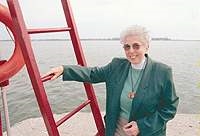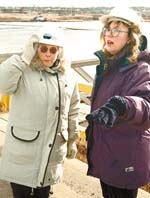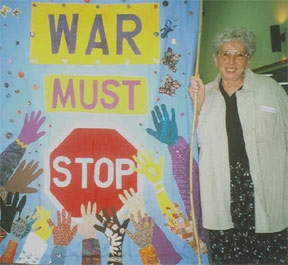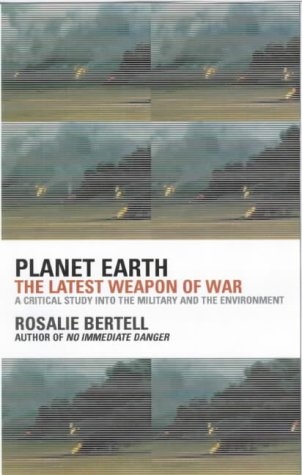 |
| Rosalie Bertell, the anti-nuclear nun (ratical.org) |
Rosalie Bertell
has many titles after and in front of her name. She is a Grey Nun of the Sacred Heart, GNSH. She holds a doctorate in biometry (the statistical analysis of biological observations and phenomena), is an environmental epidemiologist and a world-renowned researcher in the field of mathematics and nuclear science. This internationally recognized expert in the field of radiation has been given the handle, "anti-nuclear nun," for her tireless activism on behalf of the most vulnerable and threatened by radiation: women and children, aboriginals and workers in uranium mines and nuclear facilities. Dr. Rosalie Bertell, scientist and eco-feminist, is also one of 1,000 women peace activists from around the world that have been nominated, en masse, for the 2005 Nobel Peace Prize.
Sister Rosalie Bertell was a frail child from birth and knew early on that she would become a nun. Her parents encouraged her studies and she shone in mathematics and music. Her mother, a Canadian, inspired her activism, while her American father, President of Standard Mirror Co. and inventor of the night mirror in cars, encouraged her scientific abilities. "My father never finished high school, but taught himself optics. He delighted in my success in math and everything I did." When asked how they influenced her career path, she replied, "My mother never celebrated the end of WW2. She kept saying over and over: 'they shouldn’t have done it.' I don’t know how she understood about the bomb, since no one knew at that time. It was her Irish sixth sense! My father opposed war and would not invest in uranium, as so many did after the war."
 |
| Rosalie Protesting with the Sierra Club (sierraclub.org) |
Bertell went on to a research job at the Roswell Park Cancer Institute, the world's first cancer research facility. It was here that she first became interested in radiation and nuclear matters. Of this time, she says, "I was a senior cancer research scientist studying the harm done to a large population by unnecessary uses of diagnostic medical X-ray. I became outraged when I found that nuclear power plants were releasing radioactive materials (like X-rays) at this same level routinely, indiscriminately exposing the unsuspecting public. My first experience was a nuclear plant, which wanted to locate its facility next to the Gerber's Baby Food Farm in Barker, NY. That plant was never built." (The first time the nuclear industry was denied a location in the U.S.)
During this time, Sister Bertell also taught math at D'Youville College and, exhausted by her dual workload, suffered another heart attack in 1972. It was during her convalescence that she discovered the data on the Hiroshima and Nagasaki bombings. "I spent a year in a Carmelite Monastery looking at what we had done in Hiroshima and Nagasaki and the human dimensions of this catastrophe. I also prayed to know what small part I could play in helping to restore some humanitarian concerns to our society, which could so thoughtlessly wipe out 150,000 old men and women, mothers and children. I believe that we need to use our time and talents in as efficient a way as possible, but to realize that God loves this world more than we ever could and, ultimately, God is in charge. We do not have to do it alone."
 |
| War Must Stop Painting with Sister Rosalie Bertell (awakenedwoman.com) |
Armed with 10 years in radiation data, Dr. Bertell emerged as the foremost expert in the field. "Soon I was caught in the anti-nuclear network, and because I had a database of medical information, I was constantly asked to speak," Bertell says. "I began to realize it was routine for the military to release radiation and that it also set radiation standards." Meanwhile, the Roswell Institute, which favoured the nuclear industry because of its research dollars, was putting pressure on her. Dr. Bertell recalls, "Scientists are economic prisoners. I was told what I could say, so I quit."
Can you explain in simple terms the science behind nuclear power?
"Nuclear fission is a violent process of breaking open a large atom, usually uranium 235 or plutonium 239, and releasing the energy which has been holding the large atom together for thousands of years. This energy is used to boil water and turn a turbine, just as any steam engine operates. The problem is this reaction produces much more energy than is needed to boil water, produces about 500 radioactive atoms (the atoms which we use for life and which were never radioactive before this process was undertaken), and leaves a tremendous amount of toxic waste which must be contained away from living beings for the rest of the history of the planet. Nuclear reactors routinely release the toxic radioactive gases to the air and toxic radioactive water to the rivers and lakes nearby. Only the solid radioactive waste is retained."
 |
| Planet Earth: Latest Weapon Of War (www.pugwashgroup.ca/) |
Why do so many countries still focus on nuclear power? Why not harness the wind and the sun?
"The easy reason is that they do not know how to charge for the sun. Also, the vested interests in oil, gas and coal resist any change. They are very powerful!"
What is HAARP and how is it affecting the planet?
"HAARP is a facility built jointly by the US Army and US Navy in Gacona, Alaska. It consists of a large matrix of radio-transmission towers - now 48, but 150 are planned. It is able to send a synchronized energy wave into the ionosphere (the atmospheric layer of plasma, which is normally used to transmit long wave radio waves). This facility is experimenting with making changes in the ionosphere, and then measuring the effect of such changes on the lower stratosphere and biosphere. It has the potential to change the course of the jet stream and the major vapor rivers, altering climate and weather on the planet. It is a potentially powerful weapon system, able to wipe out communication globally."
Can you explain the "disconnect" and/or denial that seems to be happening with regard to the current nuclear and arms race? (Sister, it seems to me that people are more interested in celebrity gossip and so-called reality shows than in the high stakes game going on between countries regarding nuclear power and weapons, depleted uranium and other horrific weapons of war.)
"I think the problem is short-term thinking and money-based goals. There are few women (feminists) placed in the halls of power speaking for the air, water and land, and the survival of the human race."
What can the ordinary citizen of the world do to help stop this madness?
"Reading and talking help. Our democracy has gone dictatorship, and the population is ready to concede all self-government in the face of fear and perhaps contrived terror plots. I think staying sane yourself is a great beginning."
If you had the attention of the world for 10 minutes, what would you do or say?
"Love God, love and respect your brothers and sisters. Know that we are given this Earth for our use and pleasure, but must pass it on intact for future generations to use and enjoy."
Who is your hero and why?
"Dr. Alice Stewart for my scientific work, because of her integrity and courage. She looked at a population, rather than individuals, as her “patient." For a spiritual model, I love Elijah the Prophet, who was very active and very contemplative, and St. Theresa of Avila, his spiritual daughter, who suffered much from society but continued to found the Discalced Carmelite Order."
What brings you joy?
"Nature, which is so grateful for the sun and rain and good soil!"
What makes you laugh?
"People and giraffes."
Where does your hope lie for the future of the planet?
"That some sanity will prevail and we will not destroy this special planet, our home. That it will become a place of peace and shared joys."
Page created on 5/16/2007 2:54:36 PM
Last edited 12/20/2016 1:19:28 AM
Excerpt from Rosalie Bertell's book
Planet Earth:The Latest Weapon of War
(A critical study into the Military and the Environment.)
"It is my belief that we have been treating the symptoms but not the cause of the disease of the Earth. We have been abusing Earth's natural systems, the way it regulates temperature and water supply, recycles waste and protects life. For me, some of the most fundamental abuses have occurred because of our continued reliance on the military.
Wars result in immediate deaths and destruction, but the environmental consequences can last hundreds, often thousands of years. And it is not just war itself that undermines our life support system, but also the research and development, military exercises and general preparation for battle that are carried out on a daily basis in most parts of the world. The majority of this pre-war activity takes place without the benefit of civilian scrutiny and therefore we are unaware of some of what is being done to our environment in the name of "security".
Biographical Sketch: Rosalie Bertell
2005 Nobel Peace Prize - nominee
United Nations Environment Programme, Global 500 Laureate - 1993
Alternative Nobel Prize: Right Livelihood Award - 1986
World Federalist Peace Award - 1988
Ontario Premier's Council on Health: Health Innovator Award - 1991
Marguerite D'Youville Humanitarian Award, Lexington, MA - 1992
Rosalie Bertell, PhD, GNSH, is President of the International Institute of Concern for Public Health (IICPH), and Editor in Chief of International Perspectives in Public Health.
Dr. Bertell served four years as Co-chair for Canada on the Ecosystem Health Workgroup of the Science Advisory Board to the US - Canada International Joint Commission (IJC) on the Great Lakes, and currently serves on the IJC Nuclear Task Force. She also serves as advisor to the Great Lakes Health Effects Program of Health Canada, and to the Environmental Assessment Board of Ontario.
Dr. Bertell Directed the International Medical Commission - Bhopal, which investigated the aftermath of the Union Carbide disaster in Bhopal, and the International Medical Commission - Chernobyl, which convened the Tribunal on violations of the human rights of victims in Vienna, April 1996.
She has received numerous awards and five honorary Doctorate degrees since launching the IICPH in 1984.
Dr. Bertell is a member of the Grey Nuns of the Sacred Heart.
Dr. Bertell earned a Doctorate in Biometry at the Catholic University of America, Washington, DC, in 1966, and has been working ever since in environmental epidemiology. She has collaborated in analyses undertaken in the US, Canada, Japan, the Marshall Islands, Malaysia, India, Germany, Ukraine and other countries.
Author of Handbook for Estimating the Health Effects of Ionizing Radiation (1984, 1986) and the popular non-fiction book, No Immediate Danger: Prognosis for a Radioactive Earth, together with more than a hundred articles, book chapters and poems, Dr. Bertell has reached medical, scientific, and popular audiences around the globe.
No Immediate Danger, has been translated into Swedish, French, German and Finnish. A Russian translation is in process.
By choice, Dr. Bertell works with indigenous people and economically developing countries as they struggle to preserve their human rights to health and life in the face of industrial, technological and military pollution.
She was a founding member of IICPH, an attempt to institutionalize her growing concern for human survival on an intact planet.
